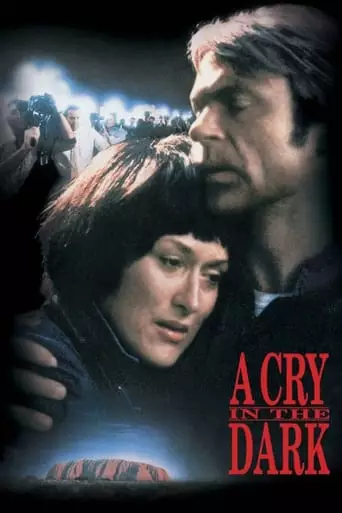
A Cry in the Dark (1988) Watch Online Free
Based on the true story of Lindy Chamberlain who, during a family camping trip to Ayers Rock in central Australia, claimed she witnessed a dingo take her baby daughter, Azaria, from their tent. Azaria’s body was never found and, after investigations and two public inquests, she is charged with murder.
Evil Angels (1988), known internationally as A Cry in the Dark, is a compelling drama directed by Fred Schepisi, based on the true story of Lindy Chamberlain and the tragic disappearance of her infant daughter, Azaria. Set in the Australian Outback, the film chronicles the events leading up to and following Azaria’s disappearance, highlighting the ensuing media frenzy and the subsequent trial that captivated the nation.
Lindy Chamberlain (Meryl Streep) and her husband, Michael (Sam Neill), are devout Seventh-day Adventists who embark on a camping trip to Uluru (Ayers Rock) with their two young children. During the night, Lindy reports that a dingo—a wild dog native to Australia—entered their tent and abducted Azaria. Despite her distress and the lack of physical evidence, the couple faces intense scrutiny from the media and the public.
The film meticulously portrays the investigation and trial, focusing on the couple’s unwavering belief in their innocence amidst growing public skepticism. Lindy’s statement, The dingo’s got my baby, becomes emblematic of the case, symbolizing her plea for understanding and justice. The narrative delves into themes of prejudice, the rush to judgment, and the impact of media sensationalism on public perception.
Evil Angels explores several profound themes:
Upon its release, Evil Angels received critical acclaim for its powerful storytelling and the compelling performances of its leads. Meryl Streep’s portrayal of Lindy Chamberlain earned her an Academy Award nomination for Best Actress. The film also sparked renewed public interest in the Chamberlain case, leading to discussions about the role of the media in legal matters and the potential for bias in high-profile trials.
The film’s impact extended beyond cinema, influencing public discourse on justice and the media’s role in shaping narratives. It served as a poignant reminder of the dangers of jumping to conclusions and the importance of thorough investigations in the pursuit of truth.
After viewing Evil Angels, audiences are likely to experience a range of emotions, from empathy and sorrow to indignation. The film’s portrayal of a family’s ordeal and the miscarriage of justice may evoke a deep sense of empathy for the Chamberlains and a critical perspective on the role of the media in legal matters. The emotional depth and complexity of the narrative leave a lasting impression, prompting reflection on themes of justice, prejudice, and the human capacity for resilience.
